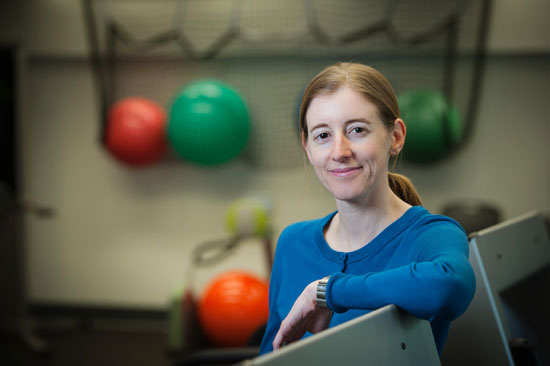Submitted by VCH Research Institute
Scenery Slater, a patient at the BC Cancer Agency in Vancouver, went to pick up her mail in the lobby of her West Vancouver apartment building one day, but when she got back into the elevator, she forgot what floor she lived on.
She would try to turn off lamps in her home with a wall switch, only to realize that she had to use the lamp switch.
She would make Yorkshire pudding for herself and her father, determined to halve the recipe, and wind up doubling it instead.
At first, Scenery didn’t think any of this had anything to do with her chemotherapy for breast cancer. Then she heard about “chemo brain”—a decline in cognitive function experienced while receiving a powerful cocktail of anti-cancer drugs.
“You don’t hear about chemo brain before starting treatment,” says Scenery, 49. “You get all this information about the drugs you’ll be taking and the possible side effects, and no one mentions that. But when I talk to people who have had chemotherapy, I’ve only come across one who hasn’t experienced some sort of cognitive interruption to some degree or another.”
Now a Vancouver Coastal Health and UBC researcher is trying to determine if there might be a simple remedy — exercise.
Dr. Kristin Campbell (PhD), physiotherapist and exercise and brain health researcher with VCH and UBC is seeking breast cancer patients for a first-of-its-kind experiment: one group of randomly chosen women engage in a cardiovascular workout four times per week for six months, while another group of women maintain their usual lifestyle. At the beginning and at the end of their participation, the women take tests of working memory, learning and problem-solving. While they perform simple tasks, they also have their brain function assessed using functional magnetic resonance imaging and electroencephalograms.
A growing body of research, some of it by Dr. Campbell’s colleague Dr. Teresa Liu-Ambrose (PhD), an investigator with the Centre for Hip Health & Mobility and the Brain Research Centre at VCH and UBC, has demonstrated that exercise can improve cognitive function in older adults.
“Exercise and cognition is an emerging field,” says Dr. Campbell. “There’s a consensus that there’s something there. But why, and what type of exercise is most important, hasn’t been answered.”
Scenery, who completed her chemotherapy in the fall of 2010, is still grappling with what she perceives to be diminished mental acuity, but the study is helping her discover other benefits of exercise. She is more energetic and sleeping better.
Although her participation in the study has ended, she continues to work out on the treadmill in her apartment building, three times a week.
Anyone interested in participating in this research study should contact research coordinator Tiffany Moore at td.moore@ubc.ca or 604-827-1914. For more information on the study visit cepl.rehab.med.ubc.ca.
This story first appeared in the June 2012 edition of UBC Reports.

